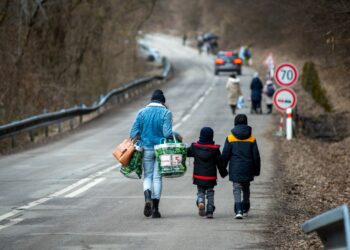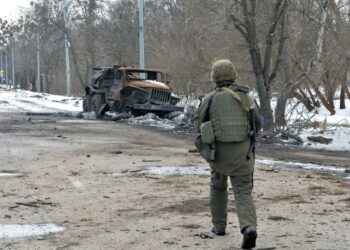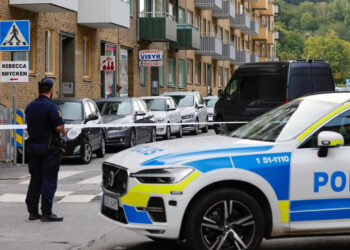Sweden’s intelligence agency heightened its terror alert level Thursday to four on a scale of five after angry reactions in the Muslim world to Koran burnings in Sweden made the country a “prioritised target.”
The level was increased from “Elevated”, where it had been since 2016, to “High”, the head of the Swedish Security Service (Sapo) Charlotte von Essen told reporters.
“The reason for this decision is the deteriorated situation with regard to attack threats to Sweden, and the assessment that the threat will remain for a long time,” she said.
Speaking at a separate press conference, Swedish Prime Minister Ulf Kristersson said “planned terrorist acts have been averted.”
“People have been arrested, both in Sweden and abroad,” he said, providing no other details.
Von Essen and Kristersson urged Swedes to continue to go about their lives “as normal” but to remain alert to anything unusual and “stay informed.”
Von Essen stressed the decision was not based on a “single incident”, but rather a “collective assessment.”
She said the attack threat “posed by violent Islamist actors has increased in the past year.”
“Sweden has gone from being considered a legitimate target for terrorist attacks to being considered a prioritised target,” she explained.
Sweden, like neighboring Denmark, has in recent months seen a spate of public desecrations of the Koran, including burnings, which have sparked widespread outrage and condemnation in Muslim countries.
Those incidents “have contributed to the image of Sweden as a country hostile to Muslims,” the head of the National Centre for Terrorist Threat Assessment, Ahn-Za Hagstrom, told reporters at the same press conference.
Iraqi protesters stormed the Swedish embassy in Baghdad twice in July, starting fires within the compound on the second occasion.
The Jeddah-based Organisation of Islamic Cooperation has also voiced “disappointment” with Sweden and Denmark for not taking action following the burnings.
Last week, a Molotov cocktail was thrown at the Swedish embassy in Beirut though it did not explode, and at the weekend Al-Qaeda called for attacks against the Scandinavian country.
The protests have led Sweden to beef up border controls since August 1.
Kristersson said Sweden was engaged in intense diplomatic efforts with Muslim countries in a bid to calm the “difficult” situation.
Sweden was on Islamists’ radar before the recent Koran burnings.
In 2022, the country was targeted in a vast disinformation campaign claiming its social services were “kidnapping Muslim children” and placing them in Christian homes, leading Swedish authorities to publicly deny the allegations.
The same year and in early 2023, a Swedish-Danish right-wing activist burned several copies of the Koran, both to denounce Islam and Sweden’s membership application to NATO and ensuing negotiations with Turkey.
Travel Warnings
Several Western countries had recently updated their travel advisories for Sweden, even before it raised its threat assessment.
The United States on July 26 urged its nationals to “exercise increased caution in Sweden due to terrorism.”
And on Sunday, Britain’s Foreign Office said, “terrorists are very likely to try and carry out attacks in Sweden.”
Sapo said meanwhile it had indications foreign actors were fuelling the negative narrative about Sweden.
“We know that extremist groups and foreign powers gladly use these kinds of situations that Sweden now finds itself in… They exploit this to sow further divisions,” said Sapo’s deputy head of counter-terrorism Susanna Trehorning.
The Swedish government has condemned the desecrations of the Koran while noting the country’s constitutionally protected freedom of speech and assembly laws.
It has vowed to explore legal means of stopping protests involving the burning of holy texts in certain circumstances, though a majority in parliament appear to be opposed to such a change.
Meanwhile, the PET intelligence agency in neighboring Denmark said Thursday the Koran burnings had also increased the threat of attacks there, but it had no plans to raise the terror alert level from its current 4 on a scale of 5, where it has been for several years.
Norway also said it had no plans to change its threat assessment from its current 3 on a scale of 5.
























